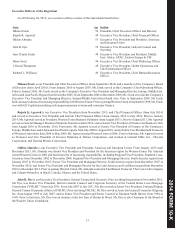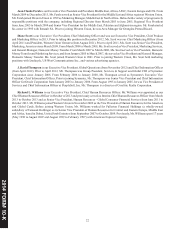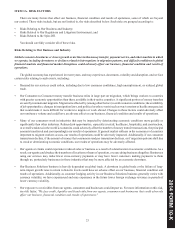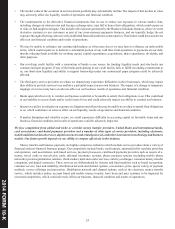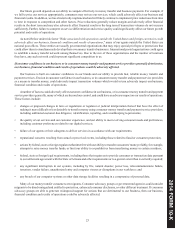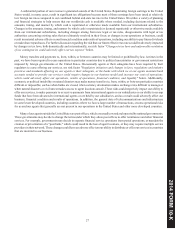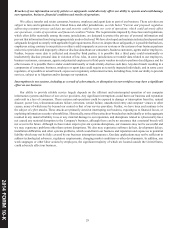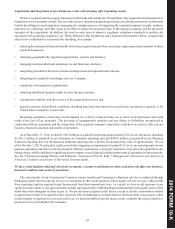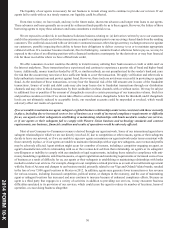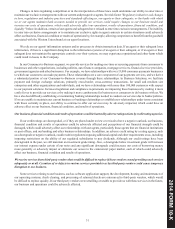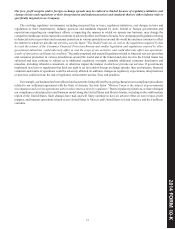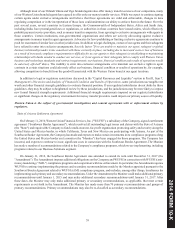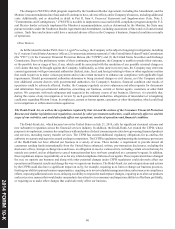Western Union 2014 Annual Report Download - page 168
Download and view the complete annual report
Please find page 168 of the 2014 Western Union annual report below. You can navigate through the pages in the report by either clicking on the pages listed below, or by using the keyword search tool below to find specific information within the annual report.
2014 FORM 10-K
30
The liquidity of our agents is necessary for our business to remain strong and to continue to provide our services. If our
agents fail to settle with us in a timely manner, our liquidity could be affected.
From time to time, we have made, and may in the future make, short-term advances and longer term loans to our agents.
These advances and loans generally are secured by settlement funds payable by us to these agents. However, the failure of these
borrowing agents to repay these advances and loans constitutes a credit risk to us.
We are exposed to credit risk in our Business Solutions business relating to: (a) derivatives written by us to our customers
and (b) the extension of trade credit when transactions are paid to recipients prior to our receiving cleared funds from the sending
customers. The credit risk associated with our derivative contracts increases when foreign currency exchange rates move against
our customers, possibly impacting their ability to honor their obligations to deliver currency to us or to maintain appropriate
collateral with us. If a customer becomes insolvent, files for bankruptcy, commits fraud or otherwise fails to pay us, we may be
exposed to the value of an offsetting position with a financial institution counterparty for the derivatives or may bear financial
risk for those receivables where we have offered trade credit.
We offer consumers in select countries the ability to transfer money utilizing their bank account or credit or debit card via
the Internet and phone. These transactions have experienced and continue to experience a greater risk of fraud and higher fraud
losses. Additionally, money transfers funded by ACH, or similar methods, are not preauthorized by the sender's bank and carry
the risk that the account may not exist or have sufficient funds to cover the transaction. We apply verification and other tools to
help authenticate transactions and protect against fraud. However, these tools are not always successful in protecting us against
fraud. As the merchant of these transactions, we may bear the financial risk of the full amount sent in some of the fraudulent
transactions. Issuers of credit and debit cards may also incur losses due to fraudulent transactions through our distribution
channels and may elect to block transactions by their cardholders in these channels with or without notice. We may be subject
to additional fees or penalties if the amount of chargebacks exceeds a certain percentage of our transaction volume. Such fees
and penalties escalate over time if we do not take effective action to reduce chargebacks below the threshold, and if chargeback
levels are not ultimately reduced to acceptable levels, our merchant accounts could be suspended or revoked, which would
adversely affect our results of operations.
If we are unable to maintain our agent, subagent or global business relationships under terms consistent with those currently
in place, including due to increased costs or loss of business as a result of increased compliance requirements or difficulty
for us, our agents or their subagents in establishing or maintaining relationships with banks needed to conduct our services,
or if our agents or their subagents fail to comply with Western Union business and technology standards and contract
requirements, our business, financial condition and results of operations would be adversely affected.
Most of our Consumer-to-Consumer revenue is derived through our agent network. Some of our international agents have
subagent relationships in which we are not directly involved. If, due to competition or other reasons, agents or their subagents
decide to leave our network, or if we are unable to sign new agents or maintain our agent network under terms consistent with
those currently in place, or if our agents are unable to maintain relationships with or sign new subagents, our revenue and profits
may be adversely affected. Agent attrition might occur for a number of reasons, including a competitor engaging an agent, an
agent's dissatisfaction with its relationship with us or the revenue derived from that relationship, an agent's or its subagents'
unwillingness or inability to comply with our standards or legal requirements, including those related to compliance with anti-
money laundering regulations, anti-fraud measures, or agent registration and monitoring requirements or increased costs or loss
of business as a result of difficulty for us, our agents or their subagents in establishing or maintaining relationships with banks
needed to conduct our services. For example, changes to our compliance-related practices as a result of our settlement agreement
with the State of Arizona and changes to our business model, primarily related to our Vigo and Orlandi Valuta brands, resulted
in the loss of over 7,000 agent locations in Mexico in 2012. In addition, agents may generate fewer transactions or less revenue
for various reasons, including increased competition, political unrest, or changes in the economy, and the cost of maintaining
agent or subagent locations has increased and may continue to increase because of enhanced compliance efforts. Because an
agent is a third party that engages in a variety of activities in addition to providing our services, it may encounter business
difficulties unrelated to its provision of our services, which could cause the agent to reduce its number of locations, hours of
operation, or cease doing business altogether.



